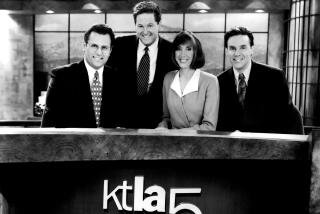All That Jazz : KLON-FM Attracts New Audience That Doesn’t Mind Sitting Out the Polka
- Share via
LONG BEACH — David Creagh wasn’t quite ready for the audience reaction when radio station KLON discarded its eclectic format of occasional opera, Portuguese programming and a parade of polkas in favor of the smooth, mainstream jazz and blues sounds of Dizzy Gillespie, Muddy Waters, Charlie Parker, Billie Holiday.
On Sept. 1, 1981, the first day that “It Don’t Mean Nothin’ if You Can’t Tap Your Feet to It” replaced the “Beer Barrel Polka” on FM88, “something ugly hit the fan,” said Creagh, who was the station’s newly imported general manager at the time.
For weeks, the Cal State Long Beach-based station was bombarded with bomb threats, obscene telephone calls and racist hate mail.
Angry polka lovers wrote to the university president, the Federal Communications Commission and their congressmen, demanding that such polka greats as “She’s Too Fat for Me” be returned to their rightful place on the Long Beach airwaves.
Chilly Reception
The format change was nothing short of revolutionary, Creagh said, and received about as warm a reception as the Emancipation Proclamation got in the South in 1863.
“It was one thing kicking a relatively successful show off the air,” Creagh said, “but you have to remember that polka music is a bastion of Germanic, Polish, Aryan interest. To replace a polka show with a blues program with artists named Muddy Waters, Lightnin’ Sam Hopkins, B.B. King and Z.Z. Hill, to put black performers on during polka hour, sent people through the roof.”
But becoming “Jazz Radio” wasn’t KLON’s first metamorphosis, and it won’t be its last.
In less than four years, FM88’s audience more than tripled and its budget increased nearly eightfold. And another period of change began Thursday--the station’s first day without Creagh, who left the station Wednesday to head a National Public Radio station at Johns Hopkins University in Baltimore.
Looking for Replacement
Eugene Asher, Cal State Long Beach’s director of university relations, took over Thursday morning as interim general manager, and KLON is searching for Creagh’s replacement.
KLON sneaked quietly onto the Long Beach airwaves on Jan. 3, 1950, as an adjunct of the Long Beach Unified School District. Its shows were broadcast into classrooms and used as teaching tools throughout the system. The station spent 28 of its 35 years at the far left end of the FM dial broadcasting such educational programs as “Mr. Make Believe,” “Adventures in Books,” and civics lessons so outdated that they called Ralph Bunche the undersecretary of the United Nations well into the 1960s, even though he was promoted from that position in 1955.
“Everyone who grew up in Long Beach knew KLON,” said Ken Borgers, the station’s program director, who listened to the unified district’s programming while a Long Beach grade-school student. “But I think we’ve lived that down by now.”
Polka Music Was Popular
Proposition 13, Howard Jarvis’ 1978 tax-cutting initiative, put an end to KLON’s educational radio days. Realizing that the tightened school budget could not be stretched to include such luxury items, the school district put the station up for sale, Creagh said.
Cal State Long Beach purchased the station in 1981 and hired Creagh away from his Washington job producing “All Things Considered” for National Public Radio.
When he arrived in Long Beach, the station’s strongest shows were its three hours of polka music on Saturday and Sunday mornings, Creagh said.
But that wasn’t all the station played, and polka lovers weren’t the only ones who were concerned when the format changed.
“I don’t think there was an ethnic group in the Los Angeles basin that wasn’t affected by it: Polish and Slovenian, Portuguese, (fans of) salsa, bluegrass, (and) there was an opera program,” said Walter Romanski, whose “American Polka Parade” ran from May, 1980, to May, 1981.
“It was a potpourri of just about everything you could enjoy,” Romanski said. “When they went, it hurt a lot of people. . . . But how can anyone argue with success?”
Ski Demski was one listener who could. Demski runs a Long Beach bumper sticker business, selling slogans ranging from the Alcoholics Anonymous classic “Easy Does It” to “You Bet Your Sweet Dupa I’m Polish.”
He listened to the station religiously and attended every packed KLON-sponsored polka dance on the Queen Mary.
“I don’t listen to it no more,” Demski said. “I listened to it all the time when there was different programs on it. I liked the polka music myself. I still don’t see . . . what’s wrong with one hour out of the week of polka music.”
But the station more than survived its transition, and Creagh contends that many of KLON’s former listeners and subscribers are still loyal to the station.
Even if they are not, “Jazz Radio” FM88 has attracted a new and growing following. The station has only 1,200 watts, compared to its public radio counterparts KUSC, which has 6,000, and KCRW, which has 10,000.
It reaches all of Long Beach, half of Orange County, Malibu and parts of the San Fernando Valley. Its audience has grown from about 28,000 in March, 1981, to about 110,000 today.
Its full-time staff, which produces music programming and local news, has grown from five to 21, and its budget has increased from $100,000 to about $1 million.
Different Approaches
“The largest chunk of our support is from our listeners,” Creagh said. The station’s biannual fund-raising drive brought in about $16,000 in 1981. The most recent drive, which ended late in March, brought in $162,000, he said.
About $400,000 annually comes from listener contributions with most of the remainder coming from the Corp. for Public Broadcasting and the university, said Sharon Weissman, assistant general manger.
According to Creagh, the keys to the station’s success are the same things that differentiate it from its Los Angeles-area public radio counterparts.
While KCRW makes its money and name as Los Angeles’ foremost National Public Radio station and KUSC makes its mark as the main American Public Radio affiliate in the area, KLON’s fame and fortune rest on its independence from both networks.
“We are a renegade station, one of the few major market stations not leaning on NPR for its identity,” Borgers said, although the station is an NPR affiliate and a secondary APR affiliate.
So what’s left for a public radio station? Quite a bit, according to Creagh and Borgers.
“There are three major differences between us and the other Southern California public radio stations,” Creagh said. “One is that our hallmark--our jazz programming, our blues programming and our local news programming--is created here, not brought in by satellite.”
Borgers, who is the architect of KLON’s sound, said that FM88 is not a full-service jazz station, playing the range of music from fusion to avant-garde.
“But we like to think of ourselves as playing the real stuff, music by musicians, not electricians,” Borgers said. The result is a jazz purist’s delight: blues, rhythm and blues and mainstream, melodic jazz including and stemming from the art of Louis Armstrong, Duke Ellington, Count Basie and Charlie Parker.
One of KLON’s regular listeners is Chuck Niles, KKGO’s late-night jazz host and a man known in local music circles as “Mr. Jazz Los Angeles.”
“I like them very much,” Niles said. “I appreciate what they’re doing. They are probably the only jazz station in my knowledge that plays only pure jazz music.”
The second difference is that while KUSC and KCRW depend on NPR’s “All Things Considered” and “Morning Edition,” KLON makes a concerted effort to broadcast local news programs created by its six-person, full-time news staff.
Starting July 1, the station began producing a Monday-through-Friday, 30-minute local news magazine that airs at 5 p.m. To do that, the regular broadcast of “All Things Considered” was cut from 90 to 60 minutes and delayed until 5:30. And the regular 15-minute local news show was doubled.
The listener reaction to the news show was overwhelmingly positive, Creagh said. But then, “All Things Considered” had very little Long Beach audience, because “it got heat locally for what people here thought were its liberal, left-wing biases,” he said.
The final difference between KLON and its public radio counterparts, Creagh said, is his vision of the station--”that it is a teaching radio station, like a teaching hospital, and there is no aspect of our operation that does not include students.”
Although the KLON management seems to have created a foolproof blueprint for success, more changes are being planned and carried out.
In addition to seeking a replacement to Creagh, KLON has applied to the FCC for an increase in power, requesting that the station be allowed to broadcast with 25,000 watts so that it can even further increase its already growing audience.
A statewide radio news service in cooperation with KUSC is also being planned, and could start as early as fall of 1986 or 1987.
But perhaps the biggest change in the works is KLON’s plan to possibly drop its expensive NPR affiliation. Information compiled during fund drives show pledges made during news programming do not equal the cost of buying the news show.
“Let me just say that it would not surprise me very much if, at the beginning of fiscal year ‘87, KLON dropped its membership in NPR,” Creagh said. “The programs, while excellent, are not performing.
“Our audience is small for those programs, and our listener support is small,” he said. “And we just can’t ask jazz people to subsidize news programs that much.”
More to Read
The biggest entertainment stories
Get our big stories about Hollywood, film, television, music, arts, culture and more right in your inbox as soon as they publish.
You may occasionally receive promotional content from the Los Angeles Times.








